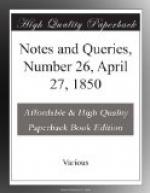“Denarius Angliae, qui nominatur Sterlingus, rotundus sine tonsura, ponderabit 32 grana in medio spicae. Sterlingus et Denarius sont tout un. Le Shilling consistoit de 12 sterlings. Le substance de cest denier ou sterling peny al primes fuit vicessima pars unicae.”—Indentures of the Mint, Ed. I and VI.
May we not derive it from Denarius by means of either a typographical or clerical error in the initial letter. This would at once give a new name—the very thing they were in want of—and we may very easily understand its being shortened into Penny.
G.
Milford, April 15.
* * * * *
HANNO’S PERIPLUS.
“Mr. Hampson” has served the cause of truth in defending Hanno and the Carthaginians from the charge of cruelty, brought against them by Mr. Attorney-General Bannister. A very slender investigation of the bearings of the narration would have prevented it. I know not how Dr. Falconer deals with it, not having his little volume at hand; but in so common a book as the History of Maritime Discovery, which forms part of Lardner’s Cabinet Cyclopaedia, it is stated that these Gorillae were probably some species of ourang-outang. Purchas says they might be the baboons or Pongos of those parts.
The amusing, and always interesting, Italian, Hakluyt, in the middle of the sixteenth century, gives a very good version of the [Greek: ANNONOS PERIPLOUS], with a preliminary discourse, which would also have undeceived Mr. Bannister, had he been acquainted with it, and prevented Mr. Hampson’s pleasant exposure of his error.
Ramusio says, “Seeing that in the Voyage of Hanno there are many parts worthy of considerate attention, I have judged that it would be highly gratifying to the studious if I were here to write down a few extracts from certain memoranda which I formerly noted on hearing a respectable Portugese pilot, in frequent conversations with the Count Raimondo della Torre, at Venice, illustrate this Voyage of Hanno, when read to him, from his own experience.” There are, of course, some erroneous notions in the information of the pilot, and in the deductions made from it by Ramusio; but the former had the sagacity to see the truth respecting this Gorgon Island full of hairy men and women. I will not spoil the naivete of the narration by attempting a translation; merely premising that he judged the Island to be that of Fernando Po.
“E tutta la descrittione de questo Capitano era simile a quella per alcun Scrittore Greci, quale parlande dell’ isola delle Gorgone, dicono quella esser un isola in mezzo d’una palude. E conciacosa che havea inteso che li poeti dicevan le Gorgone esser femine terribili, pero scrisse che le erano pelose.... Ma a detto pilotto pareva piu verisimile di pensare, che havendo Hannone inteso ne’i libri de’ poeti come Perseo




